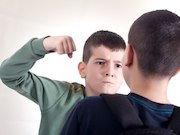Both victims and perpetrators have greater odds of developing a psychotic disorder
TUESDAY, Feb. 20, 2018 (HealthDay News) — Children involved in sibling bullying are at increased risk of developing a psychotic disorder, according to a study published online Feb. 12 in Psychological Medicine.
Slava Dantchev, from the University of Warwick in the United Kingdom, and colleagues examined 6,988 participants of a U.K. community-based birth cohort. Sibling bullying was reported at 12 years, and psychotic disorder was assessed at age 18 years via semi-structured interview.
The researchers found that even after adjustment for a range of confounders, there was a correlation for involvement in sibling bullying with psychotic disorder in a dose-response manner. The likelihood of meeting the criteria for a psychotic disorder was increased two- to three-fold for those involved in sibling bullying several times a week (odds ratios: 2.74 for victimization, 3.16 for perpetration). In categorical analysis, the risk of psychotic disorder was increased for victims (odds ratio, 3.1) and bully-victims (odds ratio, 2.66). There was a dose-effect relationship for involvement in both sibling and peer bullying, with those victimized in both contexts experiencing even greater odds for psychotic disorder (odds ratio, 4.57).
“Our study adds that children involved in sibling bullying are at increased risk of developing a psychotic disorder, in keeping with findings for other kinds of stressors during childhood,” the authors write. “If causal, as suggested by our study, this highlights the need for parents and health professionals to identify and put into place mechanisms to minimize sibling bullying within families.”
Copyright © 2018 HealthDay. All rights reserved.








